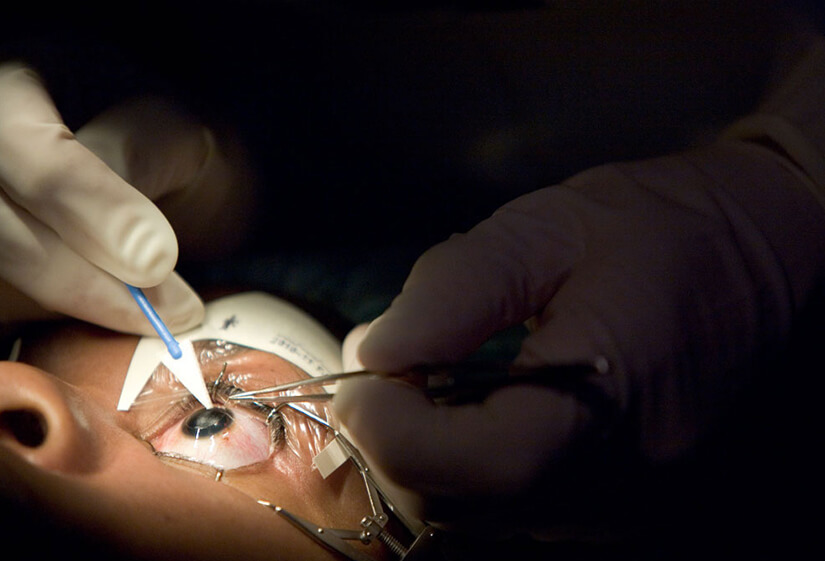Introduction
Eye surgery plays a crucial role in restoring and improving vision for individuals suffering from a variety of eye conditions. Whether you’re dealing with age-related vision problems, injuries, or genetic conditions, various types of eye surgeries are available to restore sight, reduce discomfort, or correct vision. This guide provides a comprehensive overview of eye surgery types, including what to expect before, during, and after the procedure, the costs involved, and why Vijaya Nethralaya stands out as a leading provider in this field.
Why is Eye Surgery Needed?
Eye surgery is necessary when there is a medical condition that either impairs vision or poses a risk to eye health. Doctors recommend surgery when non-invasive treatments fail or when they cannot manage an eye disease or injury with medication or lifestyle changes. Here are some common reasons for needing eye surgery:
- Cataracts: Cataracts are a condition where the eye’s lens becomes cloudy, leading to impaired vision, often due to aging.
- Glaucoma: Increased eye pressure leading to potential optic nerve damage.
- Retinal Issues: Diseases like retinal detachment or diabetic retinopathy.
- Surgeons can correct refractive errors, such as nearsightedness or farsightedness, through surgery.
- Eye Injuries: Trauma or damage to the eyes that requires surgical intervention.
- Eye Diseases: Conditions like corneal diseases, strabismus, or eye tumors.

An Essential Guide to Different Types of Eye Surgery
Eye surgery procedures are diverse, catering to various medical issues affecting vision. Here are the different types of eye surgeries, their purposes, and how doctors perform them.
Cataract Surgery
Cataract surgery is one of the most common and successful types of eye surgery performed globally. Doctors typically recommend cataract surgery when the eye’s natural lens becomes clouded, causing blurred vision, glare, and difficulty seeing at night.
During cataract surgery, the surgeon removes the clouded lens and replaces it with an artificial intraocular lens (IOL). The procedure is minimally invasive and usually involves using ultrasound to break up the cataract before removal.. The procedure is minimally invasive and usually involves the use of ultrasound to break up the cataract before removal.
Recovery: Recovery time is relatively short, with most patients experiencing clearer vision within a few days after surgery.

Corneal Surgery
Doctors perform corneal surgery to treat disorders or conditions affecting the cornea, such as corneal scarring, keratoconus, or infections.
Types of Corneal Surgery:
- In cases of severe corneal damage, doctors perform a corneal transplant to replace the damaged cornea with a donor cornea.
- Laser Surgery: For treating conditions like corneal irregularities or refractive errors, laser surgery can reshape the cornea for improved vision.
Glaucoma Surgery
Glaucoma is a serious eye disease that can cause damage to the optic nerve, often due to high eye pressure. Doctors perform glaucoma surgery to lower intraocular pressure (IOP) and prevent further damage.
Types of Glaucoma Surgery:
- Trabeculectomy: A procedure to create a drainage hole in the eye to allow excess fluid to drain out and reduce eye pressure.
- Laser Surgery: Doctors use laser procedures like Selective Laser Trabeculoplasty (SLT) to enhance fluid drainage within the eye.
- Drainage Implants: In certain cases, doctors implant a small tube to help drain fluid and reduce eye pressure.

Corrective Eye Surgery
Surgeons perform corrective eye surgery to correct refractive vision errors, such as myopia (nearsightedness), hyperopia (farsightedness), and astigmatism.
Types of Corrective Eye Surgery:
- LASIK (Laser-Assisted in Situ Keratomileusis): LASIK is the most common laser surgery to reshape the cornea to correct refractive errors.
- PRK (Photorefractive Keratectomy): Like LASIK, surgeons remove the outer layer of the cornea before reshaping it, instead of creating a flap.
- SMILE (Small Incision Lenticule Extraction): A newer, minimally invasive procedure that involves removing a small piece of corneal tissue through a tiny incision.
Retinal Surgery
Doctors perform retinal surgery when the retina, the light-sensitive layer at the back of the eye, is damaged. This can occur due to conditions such as retinal detachment, diabetic retinopathy, or macular degeneration.
Types of Retinal Surgery:
- Surgeons perform a vitrectomy by removing the vitreous gel in the eye to access and treat retinal issues.
- Retinal Detachment Surgery: A procedure to reattach the retina to its proper position, often using lasers or gas bubbles to secure it in place.
- Doctors use laser treatment for diabetic retinopathy or retinal tears to seal retinal holes or abnormal blood vessels.
Squint Surgery
Surgeons perform squint (or strabismus) surgery to correct eye misalignment, which can affect depth perception and cause double vision.
How It Works: The surgery involves adjusting the muscles around the eyes to realign them and improve coordination between the eyes.
Oculoplastic Surgery
Surgeons perform oculoplastic surgery to treat functional and cosmetic issues around the eyes, such as drooping eyelids, eye socket deformities, or tumors.
Common Procedures:
- Blepharoplasty: Surgery to remove excess skin or fat around the eyelids to improve vision or aesthetics.
- Eyelid Reconstruction: Rebuilding the eyelid after injury or disease.
- Orbital Surgery: Surgical correction of the eye socket for issues like orbital fractures.
Before the Surgery
Proper preparation is key to the success of any eye surgery. Before your surgery, your ophthalmologist will perform a thorough eye examination to assess your condition and determine the best surgical approach. You may be required to:
- Stop taking certain medications that may interfere with the surgery.
- After the procedure, arrange for someone to accompany you home, as your vision may be temporarily impaired and you may not be fit to drive.
- Fast for a specific period, especially if you are undergoing anesthesia.
During the Surgery
The surgical process varies depending on the specific procedure, with each requiring tailored techniques and approaches. However, most eye surgeries are performed on an outpatient basis, allowing you to go home the same day. During the surgery, doctors typically follow these steps:
- Anesthesia: Doctors often use local anesthesia to numb the eye, with or without sedation. For certain surgeries, especially in children, they may require general anesthesia.
- Incision: The surgeon makes a small incision in the eye or surrounding areas, depending on the type of surgery.
- Surgical Procedure: The surgeon performs the necessary operation (e.g., removing cataracts, repairing retinal damage, etc.).
- The surgeon closes the incision using sutures or allows it to heal naturally.
After the Surgery
After your eye surgery, it’s important to follow the recovery instructions provided by your ophthalmologist to ensure a smooth healing process. Some general post-surgery care includes:
- Using prescribed eye drops to prevent infection or reduce inflammation.
- It is important to avoid strenuous activities for a few days or weeks to allow proper healing after the procedure.
- Wearing protective eyewear, especially during the night or while sleeping.
- Attending follow-up appointments to monitor healing.
How Long Does It Take in Eye Surgery?
Eye surgeries are generally quick, with many procedures lasting less than an hour. For example, cataract surgery can take about 15–30 minutes. However, more complex surgeries like retinal or glaucoma surgery may take longer.
How Long Does It Take to Recover?
Recovery time varies depending on the type of surgery, with some procedures requiring only a few days and others needing several weeks for full healing. For minor procedures like LASIK or cataract surgery, recovery can be as quick as a few days. More complex surgeries, such as retinal or glaucoma surgery, may require several weeks to months for full recovery. Attending all follow-up appointments is crucial to ensure proper healing and monitor any potential complications after the surgery.
Cost of Eye Surgery
The cost of eye surgery depends on various factors, including the type of surgery, the surgeon’s expertise, and the facility where the surgery is performed. In India, the cost of eye surgeries like cataract surgery may range from ₹20,000 to ₹1,00,000 or more, depending on whether it involves basic or premium IOLs, and the complexity of the procedure.
What Are the Considerations for Anesthesia During Eye Surgery?
The surgeon selects the type of anesthesia based on the surgery and the patient’s health condition. Most eye surgeries use local anesthesia to numb the eye while keeping the patient awake. However, for more complex surgeries or young children, the surgeon may use general anesthesia.
Are There Special Anesthesia Considerations for Children?
Yes, children undergoing eye surgery may require general anesthesia. Pediatric anesthesiologists ensure the child is safely sedated during the procedure. The doctor informs parents of any additional steps needed before the surgery, including fasting or medications.
Are There Medical Conditions That Can Complicate Eye Surgery?
Certain medical conditions can increase the risk of complications during or after eye surgery. Conditions such as diabetes, high blood pressure, and uncontrolled glaucoma can affect healing. Your ophthalmologist will assess your medical history and may require you to manage certain conditions before proceeding with surgery.
What Should I Do to Prepare for Surgery?
Preparation for eye surgery typically involves:
- Having a pre-surgical eye exam.
- Discussing your medical history with your surgeon.
- Following any pre-surgery instructions, such as stopping medications or fasting.
- Ensuring you have transportation home post-surgery.
Will I Feel Any Pain During My Surgery?
Pain during eye surgery is generally minimal due to the use of anesthesia. However, you may experience mild discomfort or pressure during the procedure. Post-surgery, some patients may feel soreness or irritation, but this is usually manageable with prescribed medications.
Top eye surgeons in India perform procedures like cataract surgery, LASIK, and retinal treatments using advanced techniques for optimal results.
India is home to some of the world’s best eye surgeons who specialize in a wide range of eye surgeries, from LASIK and cataract surgery to complex retinal and glaucoma surgeries. Surgeons at top eye hospitals like Vijaya Nethralaya in Bangalore are highly trained and perform cutting-edge procedures to ensure optimal outcomes for their patients.
Why Vijaya Nethralaya?
Vijaya Nethralaya is a premier eye care hospital that has been a leader in performing advanced eye surgeries. The hospital is known for its expertise in a wide range of eye surgeries, including cataract surgery, LASIK, corneal transplants, and retinal surgeries. The hospital’s skilled team of surgeons, along with state-of-the-art technology, ensures the highest standards of care for every patient.
Conclusion
Eye surgery is a life-changing procedure for many individuals, restoring vision and improving quality of life. With a variety of procedures available for different eye conditions, it’s important to consult with an experienced ophthalmologist to determine the best course of action for your unique needs. Whether it’s a routine cataract surgery or more complex retinal or glaucoma surgeries, trust in leading institutions like Vijaya Nethralaya to deliver world-class care and results.
Author Details:
Dr. Sushruth Appajigowda holds a prominent position as a Cornea, Cataract, Glaucoma, and LASIK Surgeon in Bangalore. He serves as the chief Cataract and Refractive surgeon at Vijaya Nethralaya Eye Hospital, Nagarbhavi Bangalore. Renowned as one of the finest LASIK surgeons nationwide, he brings with him over 12+ years of experience across multiple LASIK platforms, including ZEISS, ALCON, SCHWIND, AMO, and Bausch and Lomb. Having successfully conducted over 5000 LASIK procedures, Dr. Sushruth holds the title of a Certified Refractive Surgeon and a Fellow of the All India Collegium Of Ophthalmology. Furthermore, he stands as a distinguished speaker at various National and International Forums, using his expertise to guide you in selecting the most suitable procedure based on your health requirements.

http://vijayanethralaya.com/link-in-bio/
FAQ
What is the most common eye surgery?
Cataract surgery is the most widely performed eye surgery worldwide, helping restore vision by removing the cloudy lens and replacing it with an artificial one.
Minor eye surgery procedure
Minor eye surgeries include procedures like removing a foreign object from the eye or treating minor eyelid issues.
Common eye surgery for older adults?
Cataract surgery and glaucoma surgery are commonly performed on older adults.
What are the benefits of eye surgery?
Eye surgery can restore or improve vision, alleviate discomfort, and prevent further eye damage.
Are there any side effects or risks for eye surgery?
While risks are minimal, potential side effects can include infection, bleeding, or temporary discomfort.












